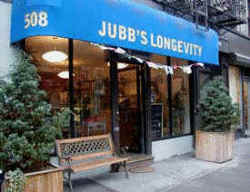A store called Jubb’s Longevity had its heyday in the East Village of NYC long before gentrification pushed the hippies aside. I remember being intrigued by the name and asking my friend (who was the unofficial mayor of the East Village) about the store. She shared that Jubb was a breatharian, a practitioner of the philosophy that it’s both possible and healthiest to live on air and light as the primary source of nourishment. My first thought (after “only in the East Village”) was “what could they possibly sell in the store, if there’s nothing to consume?” We went in, and I recall books sparsely spread out on the shelves and maybe some teas and herbal cleanses.
I hadn’t thought about this store in years, but I
found myself longing for the days of Jubb recently.
Today's new is that rice, the proverbial health food, may contain arsenic.
Hmm, am I really slowly poisoning my daughter? I've found equally disturbing things about our food supply lately in my quest to find what's healthiest for Claire.
Now, in case you're thinking “she’s just another conspiracy nut”, let me assure you that I don’t go looking for this stuff. One seemingly innocent internet search suddenly leads to any number of doomsday proclamations. I try to find out about the benefit of feeding my child cod liver oil (none, it’s contaminated with PCB’s), and stumble upon Excitotoxins. The story goes that Excitotoxins are hidden in all kinds of prepared food from soups to frozen foods, and can lead to damage to the nerves and endocrine system. Then, I am looking for iron rich foods to feed Claire and learn that legumes and grains contain Phytates, which supposedly inhibit the uptake of iron and zinc. Next, I google “how to make your own bread”, and read that most commercial bread is made with a mutant strain of wheat that is ominously named “hydrolyzed dwarf wheat” (I learned about this one in a post called “Is Wheat Evil?”).
Now, in case you're thinking “she’s just another conspiracy nut”, let me assure you that I don’t go looking for this stuff. One seemingly innocent internet search suddenly leads to any number of doomsday proclamations. I try to find out about the benefit of feeding my child cod liver oil (none, it’s contaminated with PCB’s), and stumble upon Excitotoxins. The story goes that Excitotoxins are hidden in all kinds of prepared food from soups to frozen foods, and can lead to damage to the nerves and endocrine system. Then, I am looking for iron rich foods to feed Claire and learn that legumes and grains contain Phytates, which supposedly inhibit the uptake of iron and zinc. Next, I google “how to make your own bread”, and read that most commercial bread is made with a mutant strain of wheat that is ominously named “hydrolyzed dwarf wheat” (I learned about this one in a post called “Is Wheat Evil?”).
But
I don't recommend pitching your chickpeas and crackers or breaking out
your reading glasses to
read the fine print on a bunch of labels. Not only will you drive
yourself crazy, but you can easily find plenty of people on
the net who will argue the opposite view just as vociferously, with just
as much research to back up their claims. So the problem becomes
who to believe? I've heard that knowledge is power. I say the internet
has turned it into paralysis.
At
this point, I figure my goose is cooked (no pun intended), but I do
have the opportunity to start from scratch with Claire. I am now at a
loss about where to begin -- which brings me back to Jubb…I am starting
to think it would be
easier if we could all just live on air. Since that’s clearly not
possible, I
intend to stop googling altogether.


HA! Yes, let's all stop Googling altogether! I want to live on air! And speaking of stuff that used to be good for us and is now maybe bad for us, what does Jubb have to say about eggs? Also I feel inferior now because I've never heard of dwarf wheat. Sigh. Awesome post, Rachel!!!
ReplyDelete